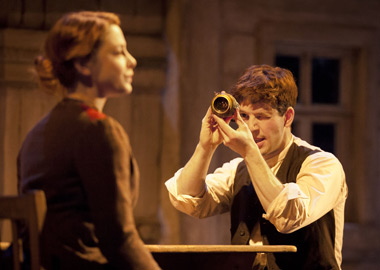Is it coincidence, or evidence of a cultural moment, that three of the films up for Best Picture Oscars on Sunday are about the silent movie era? I’m tempted to assume the latter, that our recurrent need to dip into the sweet pool of nostalgia is currently lapping up the sepia-toned years just before and after World War I.
On top of the movies about old movies on the Academy’s list, Hugo and The Artist—joined by Midnight in Paris, Woody Allen’s bouquet to the Jazz Age—a new play now running at Britain’s National Theatre draws from the same well. This latest in the NT Live series of high-def satellite broadcasts from London’s South Bank gets a repeat showing on Sunday afternoon at the Amherst Cinema (413-253-2547, amherstcinema.org).
Traveling Light is a rather unfortunate title, since it evokes images of footloose wandering but actually refers, I think, to the dynamics of motion picture projection. And the play takes place almost entirely within an isolated Eastern European village in the first years of the 20th century.
At the center of Nicholas Wright’s charming play—and center stage in Nicholas Hytner’s vigorous, inventive production—is a cinematograph, the combination camera and projector on which the first movies were made. It’s among the effects left by Motl Mendl’s recently deceased father, a photographer who recorded the weddings, bar mitzvahs and other markers of the village’s domestic life.
Motl (Damien Molony) is fascinated by the contraption and intrigued by its possibilities. So is Jacob Bindle (a fiercely ebullient Antony Sher), a rough-hewn timber merchant who is the town’s most prosperous businessman. Motl, who thought he’d escaped the shtetl for life in the city, is commissioned, or rather bribed, by Bindle to stay and shoot a movie about the village. He also falls for his assistant, Anna (Lauren O’Neil), who has a face the camera loves.
The play is both a love letter to the movies and a none-too-subtle satire on the movie business. The little cottage industry is a microcosm of latter-day Hollywood and its archetypes: the pushy producer, the temperamental director, the bean-counter accountant, the underling who gets all the ideas and none of the credit, even the critics, in the form of Bindle’s argumentative family.
Traveling Light is a delightful fiction sprouted from the fact that virtually all the great producers of early Hollywood were Jewish immigrants from Eastern Europe. Motl’s story is told in flashback by his older self, who has taken a goyishe name and become one of those movie moguls.
Like the play, the National’s production, as Hytner says in a post-show talkback that’s also part of the NT Live cybercast, is “some strange hybrid of film and theater.” As Motl projects the fruits of his moviemaking on the whitewashed wall of his aunt’s cottage, the flickering images—witty simulations of early film footage—also appear on a Cinemascope-size screen above the set.
In an era when, as one of the talk-backers observes, the movie medium itself “is becoming blurred,” with people watching films on iPads and the revival of 3D attempting to come ever closer to reality, theater is 3D without the goggles. Watching the live performance of Traveling Light on a movie screen completes that media circle. And this Sunday’s matinee showing makes a fitting segue into your Oscar-watching party.
Chris Rohmann can be reached at StageStruck@crocker.com.



